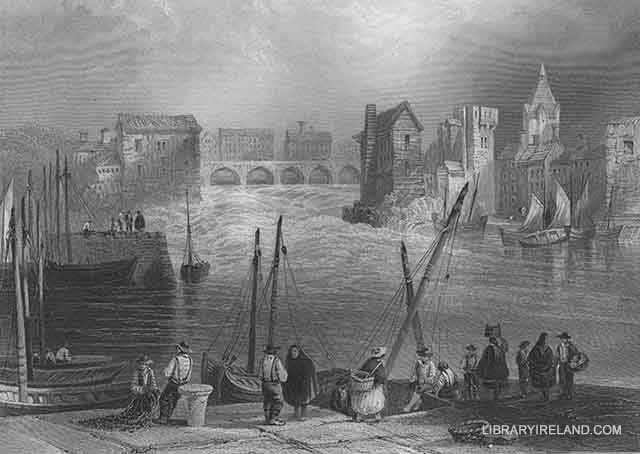The Claddagh, Galway
There is a very good view of GALWAY FROM THE CLADDAGH, a suburb of rather a singular character. We strolled thither, and found enough in the oddity of the little fishing-town to divert us from any melancholy impressions we might elsewhere have received. "The inhabitants of the Claddagh," says Wright, "about three thousand in number, speak a dialect of the ancient Irish, retain their pristine dress and customs, and, with an old-fashioned pride, boast of the separateness of their origin and race. Strangers, whom they call transplanters, they do not welcome with that hospitality that generally belongs to an ancient state of things, and they appear to have a timidity of forming matrimonial alliances beyond the limits of their own little dynasty. The marriage portion is peculiarly emblematical, and is, perhaps, the bearing adopted in the arms of the town; it is a small fishing-boat, or, amongst the poorest, a share in one, given to the son-in-law.
"Their dexterity in the management of the boat, and in encountering the dangers incident to the fisherman's life, is proverbial; and landsmen may view with surprise the happy results of skill, prudence, and propriety in the pursuit of a life so full of peril. Part of their time is devoted to the mending of their nets; another, but smaller, to the enjoyments of the alehouse: but when once they put out to sea, they become cautiously alive to their awful situation, and, taking with them oaten cake, potatoes, water, and fire, never suffer any species of malt drink or spirits to form part of their store. The fisherman's return, however, is touched with different tints; safe ashore, he throws his cares overboard, commits the cargo to the happy wife and innocent children that hail his safe arrival, and, withdrawing with his messmates to the fireside, makes joyous offerings to the god of wine. During the husband's festivities are the hours of industry of wife and children; to them belong the exclusive task of disposing of the fish, and the duties of purse-bearer and controller of the household.
"On the eve of St, John, the election of a mayor and sheriffs is made by the Claddagh boys. Their mock ceremony is accompanied by real mirth; fires are lighted up in various places through the town, round which boys and girls dance in joyous hilarity, armed with long-handled besoms made of dock-stems, with which they gently touch each passenger who refuses to obey the mandate of 'honour the bonfire,' The attendants of the mayor and sheriffs are also armed with like rude fasces of authority, which in the plenitude of fun, are ultimately set on fire, and whirled round over the heads of the noisy corporation.
"The noble bay of Galway is the unfailing treasure of the Claddagh boys, and the origin and cause of the growing importance of Galway. The surface spreads over an area of two hundred square miles, the Arran Islands being taken as its sea boundary or breakwater. Its waters wash a coast of thirty miles, indented with secure and deep harbours, and possessing numerous roadsteads. In the deep water, sunfish, hake, cod, and turbot, are taken in all their varieties, and on a ground that is believed to be an extension of the Newfoundland Bank. Along the shores crustaceous fish are caught, and large and delicious oysters at Pouldudy, Burrin, and Rinvarragh. Herrings abound here in the season, and their exclusive capture is claimed by the Claddagh boys. The salmon fishing yields an annual revenue of £500, although the retail price is trifling, and the entire draught consumed at home."

